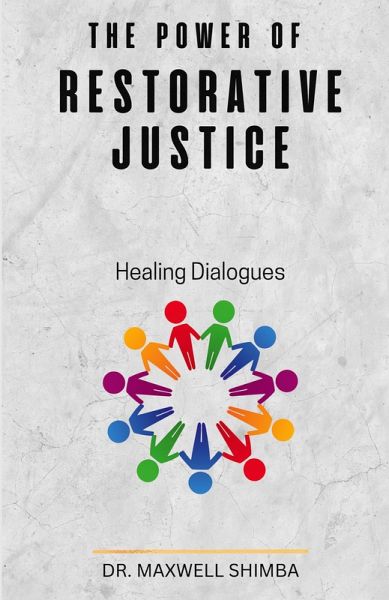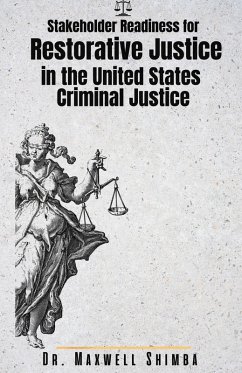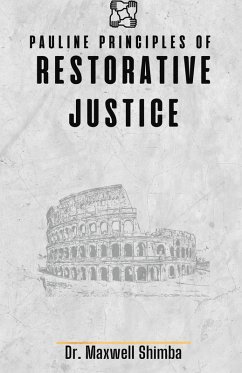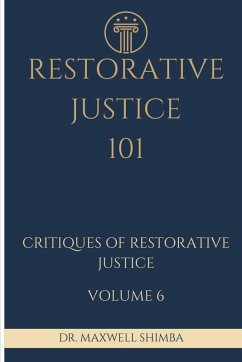
The Power of Restorative Justice
Versandkostenfrei!
Versandfertig in 1-2 Wochen
16,99 €
inkl. MwSt.

PAYBACK Punkte
8 °P sammeln!
The Power of Restorative Justice "The Power of Restorative Justice" by Dr. Maxwell Shimba is a comprehensive exploration of a transformative approach to justice that prioritizes healing, accountability, and reconciliation over punishment. Dr. Shimba delves into the foundational principles of restorative justice, highlighting its focus on repairing harm, involving all stakeholders in the justice process, and fostering community resilience. This book serves as a guide for understanding how restorative justice can be effectively implemented across various sectors, from criminal justice to educati...
The Power of Restorative Justice "The Power of Restorative Justice" by Dr. Maxwell Shimba is a comprehensive exploration of a transformative approach to justice that prioritizes healing, accountability, and reconciliation over punishment. Dr. Shimba delves into the foundational principles of restorative justice, highlighting its focus on repairing harm, involving all stakeholders in the justice process, and fostering community resilience. This book serves as a guide for understanding how restorative justice can be effectively implemented across various sectors, from criminal justice to education, workplaces, and community organizations. Principles and Practices Dr. Shimba meticulously outlines the core principles that underpin restorative justice, emphasizing empathy, accountability, and inclusivity. He explains how these principles are applied in practice through various restorative processes such as victim-offender mediation, restorative circles, and community conferencing. The book provides detailed insights into the preparation, facilitation, and follow-up of these processes, ensuring that practitioners are well-equipped to handle the complexities involved. Dr. Shimba also discusses the importance of cultural sensitivity and adaptability in restorative practices, recognizing the diverse contexts in which they are applied. Impact and Benefits One of the key strengths of "The Power of Restorative Justice" is its thorough examination of the impact and benefits of restorative practices. Dr. Shimba presents compelling evidence from case studies and research that demonstrate how restorative justice can lead to significant reductions in recidivism, enhanced victim satisfaction, and stronger community bonds. He highlights the transformative potential of restorative justice not only for individuals but also for the broader social fabric, fostering a culture of mutual respect and cooperation. Expanding Applications The book goes beyond traditional applications of restorative justice, exploring its potential in various non-criminal contexts. Dr. Shimba discusses how restorative principles can be integrated into educational settings to address bullying and disciplinary issues, into workplaces to resolve conflicts and improve team dynamics, and into community organizations to strengthen social cohesion. By providing practical examples and success stories, he illustrates how restorative justice can be a powerful tool for positive change in diverse environments. Vision for a Restorative Society In envisioning a restorative society, Dr. Shimba paints a picture of a world where justice systems are guided by the principles of healing and transformation. He advocates for systemic changes that incorporate restorative practices into policy and legislation, ensuring their sustainability and effectiveness. The book emphasizes the need for cultural shifts towards empathy and collective responsibility, promoting a society where conflicts are addressed constructively and compassionately. Dr. Shimba's vision is one of inclusive, resilient communities that prioritize the well-being of all their members. Call to Action "The Power of Restorative Justice" concludes with a call to action for stakeholders at all levels-policymakers, practitioners, and community members-to support and advocate for restorative justice. Dr. Shimba underscores the importance of collective efforts in integrating restorative practices into our justice systems and communities. He provides a roadmap for how stakeholders can contribute to this transformative movement, emphasizing the need for education, advocacy, and collaboration. By heeding this call, readers are invited to join in the effort to build a more just and compassionate world.












